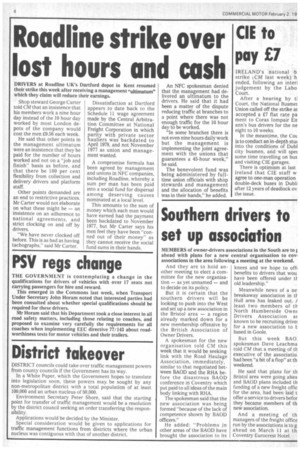Roadline strike over lost hours and cash
Page 6

If you've noticed an error in this article please click here to report it so we can fix it.
DRIVERS at Roadline UK's Dartford depot in Kent resumed their strike this week after receiving a management "ultimatum" which they claim will reduce their earnings.
Shop steward George Carter told CM that an insistence that his members work a nine hour day instead of the 10 hour day worked by most London depots of the company would cost the men £9.56 each week.
He said that other points in the management ultimatum were an insistence that they be paid for the number of hours worked and not on a "job and finish" basis as before, and that there be 100 per cent flexibility from collection and delivery drivers and platform staff.
Other points demanded are an end to restrictive practices. Mr Carter would not elaborate on what these might be — an insistence on an adherence to national agreements, and strict clocking on and off by drivers.
"We have never clocked off before. This is as bad as having tachographs," said Mr Carter. Dissatisfaction at Dartford appears to date back to the .Schedule 11 wage agreement made by the Central Arbitration Committee at National Freight Corporation in which parity with private sector hauliers was backdated to April 1978, and not November 1977 as union and management wanted.
A compromise formula has been agreed by management and unions in NFC companies, including Roadline, whereby a sum per man has been paid into a social fund for dispersal among deserving causes nominated at a local level.
This amounts to the sum of money which each man would have earned had the payment been backdated to November 1977, but Mr Carter says his men feel they have been "conned out of their money" as they cannot receive the social fund sums in their hands. An NFC spokesman denied that the management had delivered an ultimatum to the drivers. He said that it had been a matter of the dispute reducing traffic at branches to a point where there was not enough traffic for the 10 hour day to be worked.
"In some branches there is not even nine hours daily work but the management is implementing the joint agreement with the unions that guarantees a 45-hour week," he said.
The benevolent fund was being administered by fulltime union officials with shop stewards and management and the allocation of benefits was in their hands," he added.




















































































































